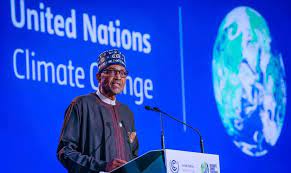Post COP 26: Nigeria Renews Pledge To Tackle Climate Change
Latest Headlines, News Across Nigeria Wednesday, December 22nd, 2021
(AFRICAN EXAMINER) – The Nigerian Government has reaffirmed its commitment to implement existing programmes and projects aimed at addressing the impact of climate change in the country.
This is coming at the heels of Nigeria’s renewed zest to further pursue initiatives geared toward achieving the national commitments made at the United Nations Climate Change Conference of Parties (COP 26), in Glasgow Scotland.
The 2014 World Climate Change Vulnerable Index report published by Verisk Maplecroft, a global risk analytics organization, classified Nigeria as one of the 10 most vulnerable countries to climate change disaster in the world.
It will be recalled that President Mohammadu Buhari who led the Nigerian delegation to the COP 26, pledged that Nigeria would cut its emissions to net-zero by 2060 and called on developed countries to give technical and financial support to developing countries to enable them to meet their Nationally Determined Contributions (NDCs) target.
President Buhari also made reference to the COVID-19 pandemic and how it affected many developing economies and why it is imperative for developing countries to assess climate finance for mitigation and adaptation projects to save our planet.
To demonstrate commitment to Nigeria’s international ambition and to support the implementation of Nigeria’s adaptation and mitigation measures, the President signed Nigeria’s Climate Change Bill into Law just days after COP 26.
Prior to COP 26, Nigeria trained over 60 negotiators to be a part of the negotiations at the global annual event. This is aimed at improving the skills and knowledge of delegates from different sectors on the international climate change decision-making process to help them engage effectively at the conference. The training also aims strengthening Nigeria’s commitment to integrating the elements of this global agreement and the NDC into her national developmental efforts.
The government also expressed its resolve to implement future programmes and projects such as the development of Nigeria’s NDC, Sectoral Action Plan, implementation of the revised NDCs, issuance of a 3rd Nigeria Sovereign Green Bond, development of a Nigeria National Readiness Plan for assessing the Green Climate Fund GCF.
In addition, the government intends to actualize the implementation of the National Action Plan on Gender and Climate Change, preparation of Nigeria’s First Technology Needs Assessment and Development of the National Adaptation Plan.
Nigeria’s Minister of State for Environment, Sharon Ikeazor made the pledge during the recently concluded Post COP 26 National Stakeholder Consultative Meeting held in Abuja, Nigeria’s capital.
The workshop is to create an opportunity for joint reflection of key stakeholders and experts on the outcome of COP 26 and the implications for Nigeria, and also discuss actions that can be taken to ensure Nigeria has a very successful COP 27 in Egypt.
The minister noted that the workshop which was attended by climate change experts and relevant stakeholders in the environment sector, will develop an implementation roadmap for national climate actions that will leverage the opportunity for just green transition that was created at COP 26.
“We are gathered here to review the outcomes of the recently concluded COP26 and deliberate on the next steps which would include a roadmap for the domestication of the outcomes of COP 26 and also a national plan for the actualisation of Nigeria’s inputs for COP 27.
“The climate change goals highlighted by Mr. President included Global Greenhouse Gas (GHG) emission reduction goal, as well as the financial pledge by developed countries to support developing nations, alongside Adaptation, Loss and Damage, Mitigation, capacity building and technology transfer’’, she said.
Ikeazor said the workshop also discussed options for efficient national reporting of Nigeria’s climate action in ways that will open opportunities for greater accountability and the mobilization of low carbon investments in the country.
“A consensus was reached on major agenda items towards addressing Climate Change by UNFCCC Parties, which allowed the adoption of the Glasgow Climate Pact, a package which strengthens ambition in the three pillars of collective climate change action, Adaptation, Finance and Mitigation.
“In the same vein, the adaptation component in Nigeria’s revised NDC, is premised on the need to avert potential risks, including significant losses that could come from sectors like energy and agriculture in the absence of planned adaptation”, she added.
She commended the development partners for acting as catalysts to strengthen 5 engagement and capacity to support transformative climate action through mobilization of resources, adding that the Ministry will continue to broaden the scope of the NDC and ensure that relevant stakeholders are being carried along in all issues of NDC implementation.
Meanwhile, it is expected that the outcome of the workshop will help a deeper understanding of the outcome of COP 26 and also a road map for the domestication of the outcome of COP 26, plan of action for Nigeria’ preparation for COP 27 in Egypt in 2022.
In a related development, the Earth Environment and Climate Care Ambassador (EECCA), an international non-governmental organisation at the forefront of climate change advocacy, has convened the first post COP 26 Annual Scientific Workshop and 500 million tree planting flag-off in Abuja.
The workshop with the theme, “Engaging the Stakeholders for Effective and Inclusive Implementation of COP26 Platforms for Action”, was held as a follow-up to the just-concluded COP 26 summit which again draws the attention of the world to the dangers of the neglect of the climate.
EECCA said the objective of the workshop is to engage the stakeholders, experts, researchers on need to deepen the climate agenda and spotlight the importance of tree planting for more mitigation and adaptation strategies and push for policies that will save the climate ecosystem.
President of EECCA, Prince James Ajah said his organization has over 50,000 climate ambassadors planting trees in all the 36 states and Federal Capital Territory (FCT) as part of the Non Governmental Organisations (NGOs) effort to compliment the effort of the Federal Ministry of Environment in an aggressive tree-planting campaign and encourage each individual, organizations, companies to sponsor tree planting in their neighbourhood and communities. “This is the least you can do to save our planet”, he further stated.
Similarly, a coalition of Civil Society Organisations (CSOs) has harped on the need for the Nigerian government to prioritize its implementation of the NDC to capture the needs of the marginalized people to promote climate change action in local communities.
The coalition made the observation at a recent Multi-stakeholders National Dialogue organized by the Climate & Sustainable Development Network (CSDevNet) to x-ray the outcome of COP 26. The group which met in Abuja agreed that is important for Nigeria to come up with a community adaptation plan that will accommodate these people and ensure that they understand the problem and their role in solving it.
The plan, according to the coalition, will also help the nation specify its technical requirement and not just accept anything proposed by the international community, adding that prioritizing these wants will help the nation to identify critical areas of climate change intervention, increase civic inclusion and further boost resource mobilization to implement the various proposed adaptation initiatives contained in the NDC.
The group equally called for the inclusion of young people who are working at the grassroots level in the domestication of COP 26 agreement in order to promote climate action, human rights, peace, and security, as well as climate education, which according to the group, are other areas of significant interest that must looked into to help Nigeria tackle its climate setback.
Climate Finance Adviser at the Commonwealth, Dr. Sam Ogallah observed that it is important for the government to start thinking of how to develop a private sector strategic plan for NDC implementation.
In a bid to help Nigeria actualize its climate ambitions, the Government of the United Kingdom (UK) has pledged to support Nigeria on the decarbonisation of the power sector.
British High Commissioner to Nigeria, Catriona Laing who made the pledge while speaking on the aftermath of COP 26, said Nigeria is highly vulnerable to climate change and although it has been ambitious in developing adaptation and mitigation plans, these plans need to be transformed into action by the federal and state governments working closely with local communities, civil society and other stakeholders, and with the support of development partners/
“We will continue to support Nigeria make progress on decarbonisation of the power sector and stay the course on power sector reforms, creating the enabling environment for off-grid solar at scale by, for example, removing high Valur Added Tax (VAT) and customs on domestic solar equipment.
“We will also continue to support efforts that will see Nigeria take action to reduce greenhouse gases such as black carbon and methane from the atmosphere by ending gas flaring as well as adopting climate smart agro-forestry and agricultural reforms as sustainable solutions for Nigeria’s people, nature and biodiversity”, she stressed.
Related Posts
Short URL: https://www.africanexaminer.com/?p=72089






















